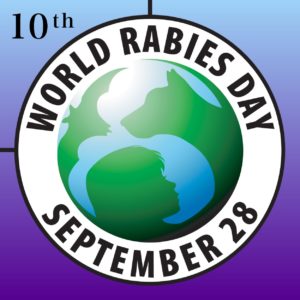
By: Cynthia Quezada, DVM
Our clinic occasionally receives calls from pet parents inquiring if the rabies vaccine is safe and if their dog or cat truly need to be vaccinated against rabies. Before addressing these questions, let’s review a few facts about rabies and the efforts implemented to help control this disease.
The last documented cases of rabies in Los Angeles County of a domestic dog was in 1966, and of a domestic cat in 1987. So why is rabies vaccination required by law for dogs and recommended for cats? Rabies is controlled through the implementation of proper vaccine protocols for pets and the close surveillance of rabies outbreaks. Before 1960, the majority of reported rabies cases in the U.S. were in domestic animals. Since 1960, most animal rabies cases in the U.S. involve wildlife. This shift in the epidemiology of the disease is due to the effectiveness of the rabies vaccine and mandatory vaccine laws. Rabies continues to be an epidemic in 150 countries world wide, with 99% of human rabies caused by dog bites.
In rare instances, the LA County Department of Public Health will grant certain dogs an exemption from receiving the rabies vaccine. These exemptions are reserved for dogs with specific medical conditions, and those with history of life threatening reactions to the rabies vaccine. Rabies vaccine exemptions are reserved for cases in which “a rabies vaccine would endanger the dog’s life” in order to preserve herd immunity. Herd immunity occurs when a critical portion of a population is immunized against a disease. This protects those individuals that have not been immunized and prevents an out-break. In order to establish herd immunity against rabies, at least 70% of dogs in a given population need to be immunized against the disease. Vaccinating your pet against rabies not only protects them as individuals, it also protects those pets that are not able to receive the vaccine.
Is the rabies vaccine for dogs and cats safe? The majority of patients do not experience any adverse reactions to the vaccine. There is no risk of developing rabies from receiving the vaccine. The most common side effects to the rabies vaccine (or any vaccine) are pain at the injection site, lethargy, inappetence and a mild fever. These are not considered life-threatening reactions and symptoms should resolve within 2 days. Some patients may develop an injection site reaction where a small, firm swelling may develop. These generally resolve in a few weeks. In rare instances, a patient may experience a severe allergic reaction to the vaccine. Signs of an allergic reaction are usually immediate and include vomiting, diarrhea, collapse, difficulty breathing, facial swelling and hives. Allergic reactions, although rare, can be life-threatening to pets and require immediate veterinary care.
Rabies is always a fatal disease, but is easily prevented by vaccination. Although canine rabies (rabies strain specific to dogs) has been eradicated from the U.S. due to mandatory vaccine laws, wildlife still remains a reservoir for the disease and current cases of rabies in domestic animals in the U.S. are from contact with rabid wildlife. In LA County, bats are the primary hosts for rabies.
So how can we, as pet owners, help eradicate this fatal disease? Here are 5 steps to take:
- Make sure your pet has a current rabies vaccine
- Avoid contact with wildlife that can transmit rabies, such as: bats, skunks, raccoons, and foxes.
- Keep your cat indoors and supervise your dog when outdoors.
- Report all dog, cat, and wild animal bites
- Bat proof your home (yes, we do have bats in LA County).
If you are not sure if your pet is due for their rabies vaccine, or if you have any other questions, please call our clinic at 310-478-5915.
